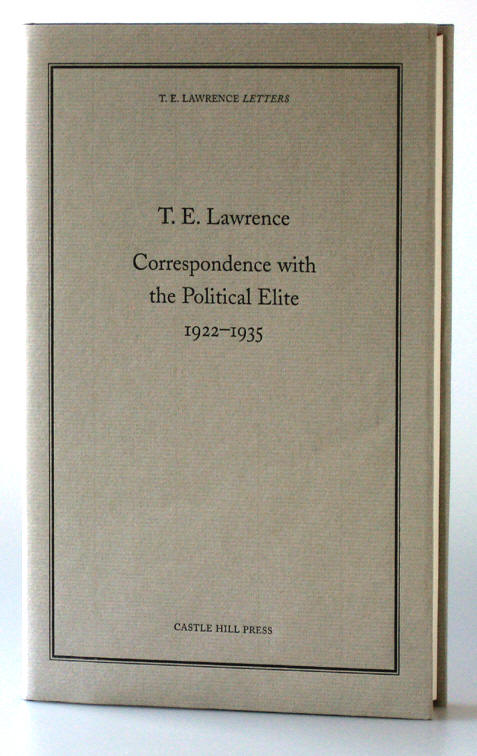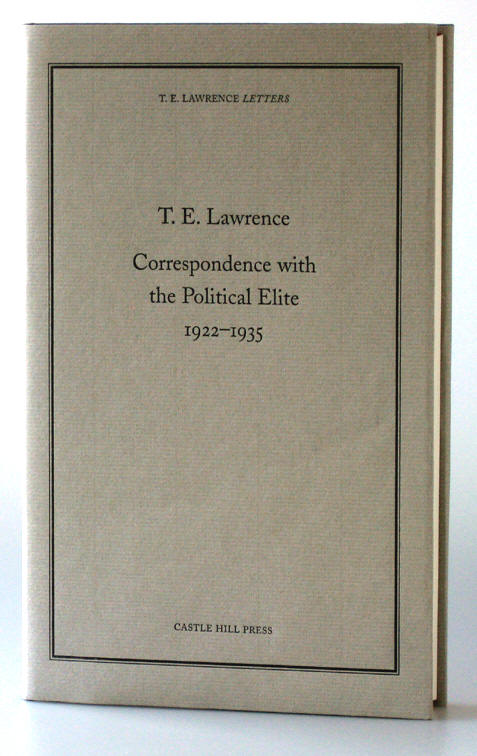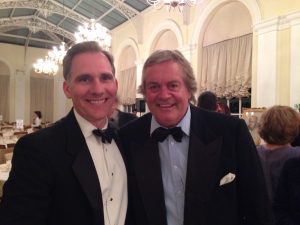Bulletin #95 - May 2016
“My dear ‘Lurens’”

May 9, 2016
Jeremy and Nicole Wilson, eds. T. E. Lawrence: Correspondence with the Political Elite, 1922–1935, Castle Hill Press, 2015, 338 pages.
Reviewed by PAUL ALKON


2025 International Churchill Conference
“Your book is complete and rather wonderful. It is beautifully written as to manner, and both style and contents form a picture of yourself more living than anything I though possible….Another thing I felt…was how past is the epoch of your youth. Nothing of the world, or attitude or society you lived in remains. Not even yourself, for the Winston of today is altogether another man. Part of your excellence lies in that flawless evocation of a temporis acti. It has gone, yet you can bring it to life, just in time. Your book will become a most precious social document….Also it is so perfect and balanced a whole. Really a work of art. There is nothing to be done textually. Let no one but yourself change a line of it.”
To a letter from Lawrence praising The World Crisis, Churchill replied on 16 May 1927:
“My dear ‘Lurens’: I read with rapt attention the long letter you wrote to Eddie [Marsh] about my book. It is a poor thing, mainly a pot-boiler, and deriving a passing vogue from the tremendous events with which it deals and the curiosity of the British public to know something about them. In fact, when I put down the Seven Pillars, I felt mortified at the contrast between my dictated journalism and yr grand and permanent contribution to English literature. I cannot tell you how thrilled I was to read it. Having gone on a three days’ visit to Paris, I never left my apartment except for meals, and lay all day and most of the night cuddling your bulky tome. The impression it produced was overpowering. I marched with you those endless journeys by camel, with never a cool drink, a hot bath, or a square meal except under revolting conditions. What a tale! The young Napoleon or Clive, if only the stupid 20th century had not made peace. No wonder you brood in haughty anticlimax! I think yr book will live with Gulliver’s Travels and Robinson Crusoe. The copy wh you gave me, with its inscription, is in every sense one of my most valuable possessions. I detected one misprint, but to torture you I will not tell you where. I am always hoping some day to get a letter from you saying that yr long holiday is finished, and that yr appetite for action has returned. Please do not wait till the Bolshevik Revolution entitles me to summon you to the centre of strife by an order ‘from the Imperial Stirrup.’”
This account of Churchill’s hideaway visit to the city of amour for three days of cuddling (a book!) displays the droll tone often evoked by Lawrence. His playfulness is most delightfully on display throughout sixty-three pages of correspondence with Nancy, Viscountess Astor, the American girl from Virginia whose improbable career included becoming Britain’s first female Member of Parliament.
Bookending the letters between Lawrence and Churchill, the editors have included Churchill’s contribution to T. E. Lawrence by his Friends and Churchill’s Speech at the unveiling of a memorial to T. E. Lawrence at the City of Oxford High School for Boys, 3 October 1936. A sixteen-page “Supplement” provided with the more expensive editions of the book includes two further letters by Churchill and Churchill’s review of Seven Pillars of Wisdom published in the Daily Mail on 29 July 1935. Thus exchanges with Lawrence after their time together at the Colonial Office are framed by works containing Churchill’s public comments on Lawrence en route to a final summing up (and some myth making) in Churchill’s essay about Lawrence in Great Contemporaries.
Other correspondents in this volume include John Buchan, Lionel Curtis, Geoffrey Dawson, Ernest Thurtle, and Philip Kerr (eleventh marquess of Lothian). A striking feature of Lawrence’s correspondence with “the political elite” is how little any of it is concerned with politics. From an RAF station in Karachi on 17 November 1927, he wrote to Lionel Curtis, who was drafting an entry about Lawrence for a new edition of Who’s Who: “I’d be grateful if you’d make it quite clear that in Winston’s 1922 settlement of the Middle East the Arabs obtained all that in my opinion they had been promised by Great Britain, in any sphere in which we were free to act: and that my retirement from politics upon that, to me, happy event was necessarily final and absolute.”
Lawrence kept to this resolution except for a few relatively minor matters, of which the most conspicuous was a successful effort, led by Ernest Thurtle, to abolish the death penalty for wartime desertion. Writing to Thurtle on 13 March 1930, Lawrence authorized him to say in support of the motion during debate in Parliament that “Col. L. on his return from Arabia said” against the death penalty: “I have run too far and too fast under fire (though never fast enough to suit me at the time) to dare throw a stone at the fearfullest creature. You see, I might hit myself in the eye.”
Seventy-three pages of correspondence with Lionel Curtis provide a moving record of the trauma left by Lawrence’s wartime experiences, the strain of trying to fulfill what he considered England’s obligations to the Arabs, and his struggles to write and rewrite Seven Pillars of Wisdom. In 1934, with retirement approaching, and another war with Germany looming, he was asked on 16 March by Curtis to help draft an article arguing that “a large part of the money now spent on naval defence ought to be spent on air force.” Lawrence was sufficiently interested to send a long letter to Curtis on 19 March detailing what the RAF ought to do after such a drastic re-ordering of defense priorities. Nancy Astor wrote on 7 May 1935 to say, “I believe…you will be asked to help re-organize the Defense forces. I will tell you what I have done already about it” and invited him to discuss the prospect with Curtis, Lord Lothian “and, far the most important, Stanley Baldwin.” On 8 May Lawrence replied, “No: wild mares would not at present take me away from [his home] Cloud’s Hill.” Before Lady Astor, famously persistent, could try again, he was injured in a motorcycle accident on 13 May and died six days later. Lady Astor and Curtis were among those who attended the funeral.
For prices and purchasing, please visit www.castlehillpress.com
Paul K. Alkon, Bing Professor Emeritus of English and American Literature at the University of Southern California, is author of Winston Churchill’s Imagination (Bucknell University Press, 2006).
Subscribe
WANT MORE?
Get the Churchill Bulletin delivered to your inbox once a month.






